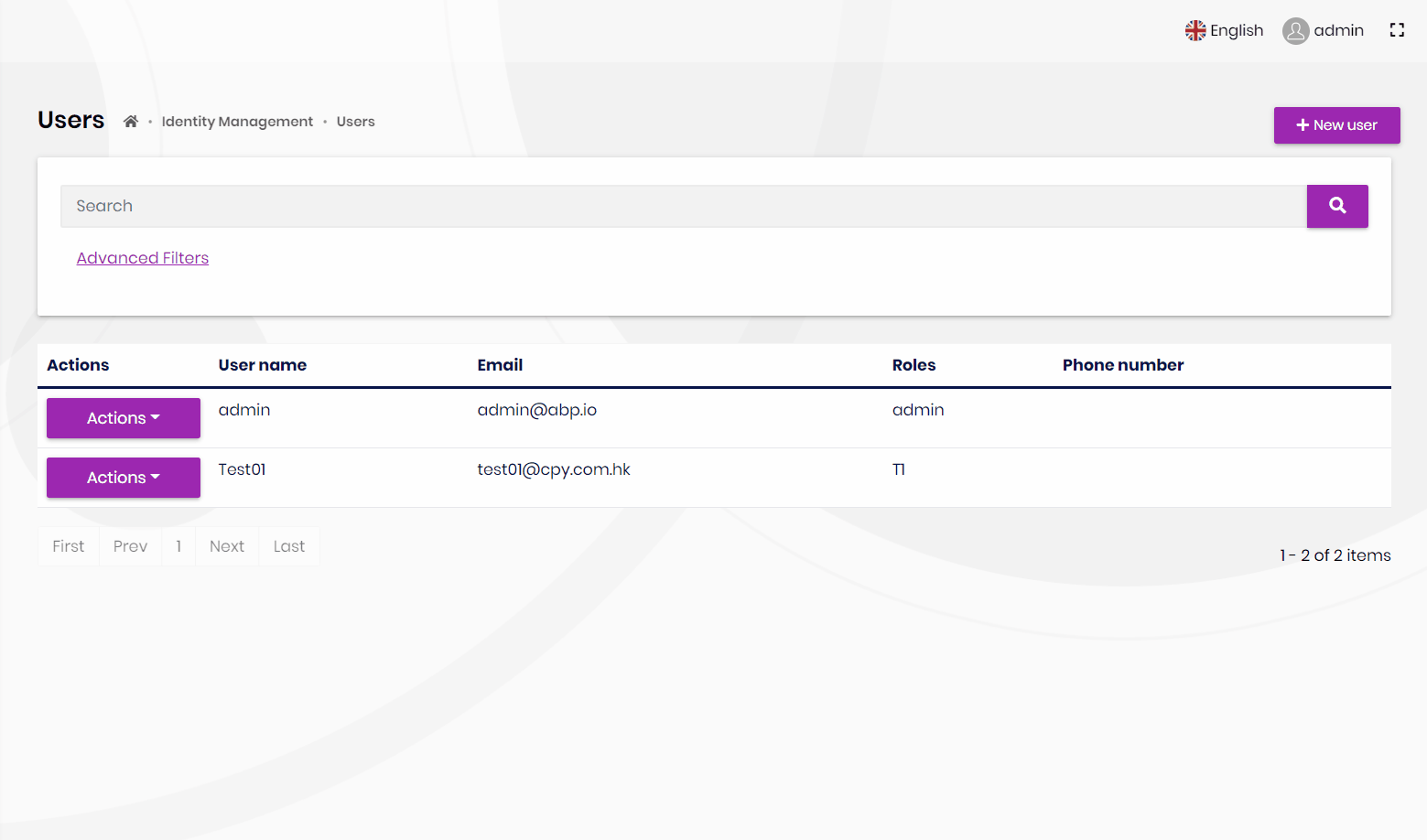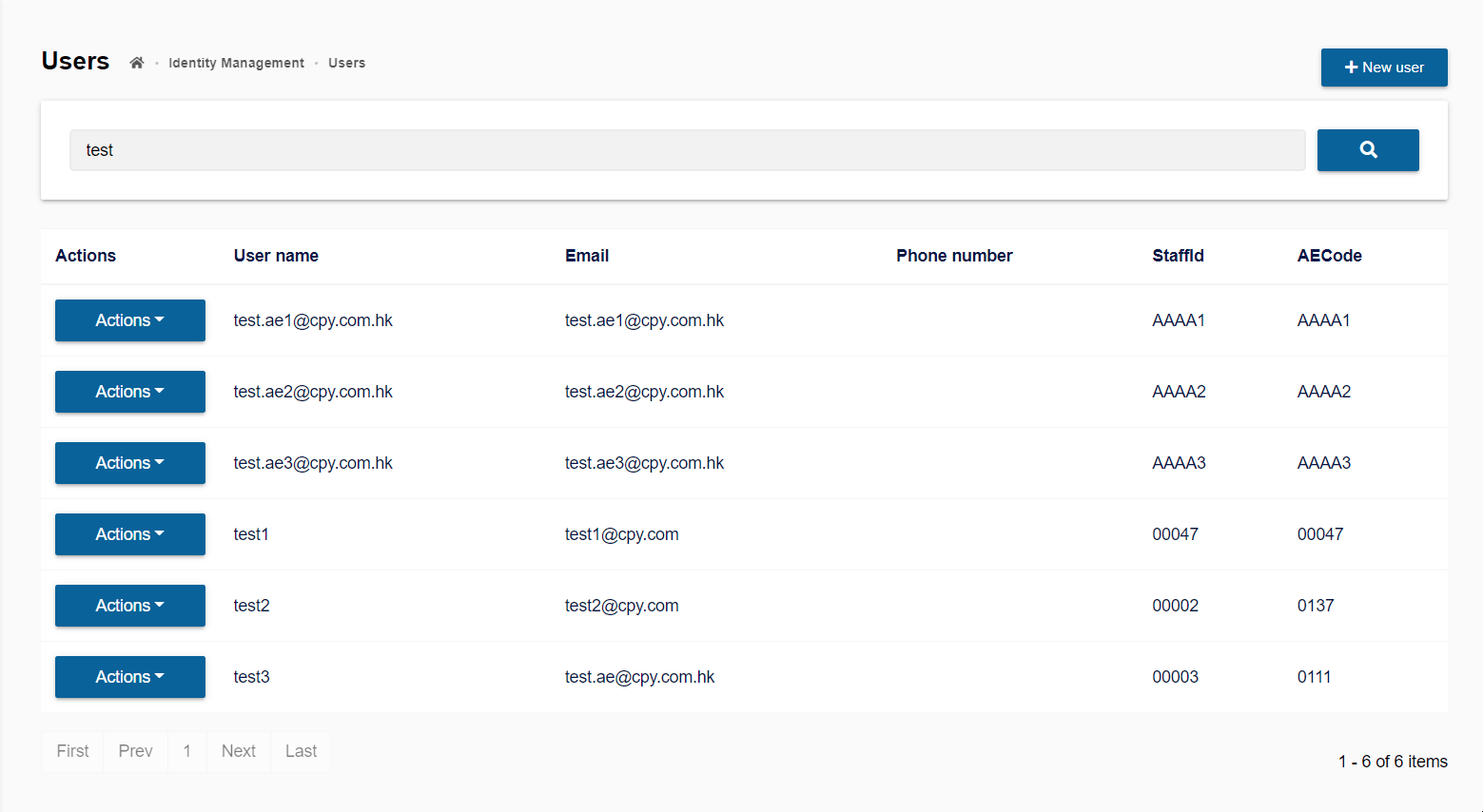Activities of "scottie.tang@cpy.com.hk"
- ABP Framework version: v8.X
- UI Type: Blazor Server
- Database System: EF Core (SQL Server)
- Tiered (for MVC) or Auth Server Separated (for Angular): yes
We have a legacy system that needs to call an HTTP API within our system, which is built on the ABP.IO framework. Currently, the default authentication method in ABP.IO involves using Client ID/Secret to authenticate the API calls.
However, we want to implement a long-lived token approach for authentication. The idea is to have a hard-coded token in the legacy system, which will be used consistently for making API calls, rather than relying on Client ID/Secret. Is this possible?
Could you please provide me with guidance on how to achieve this long-lived token authentication in the ABP.IO framework? Specifically, I would like to know the recommended approach and any necessary configurations or code modifications that need to be made.
Thanks.
- ABP Framework version: v3.1.0
- UI Type: MVC
- Database System: MongoDB
- Tiered (for MVC) or Auth Server Separated (for Angular): yes
Hi Support,
We have recently completed the migration of our application from ABP 3.1.0 to 7.4. During the process, we encountered an issue with our old UploadController, which is an additional Web API controller responsible for handling file uploads via a simple POST request. While this code worked fine in version 3.1.0, it seems to be causing problems in the upgraded version.
I would greatly appreciate your advice or guidance on this matter. Is there any specific configuration that needs to be done in the WebModule or any other steps we should take to ensure the proper functioning of the UploadController in ABP 7.4?
Thank you for your assistance.
Below is our code snippet. ( We put the code in Controllers in HttpApi )
using Microsoft.AspNetCore.Hosting;
using Microsoft.AspNetCore.Http;
using Microsoft.AspNetCore.Mvc;
using System;
using System.Collections.Generic;
using System.IO;
using System.Linq;
using System.Text;
using System.Threading.Tasks;
using Volo.Abp.AspNetCore.Mvc;
namespace TEST.Controllers
{
public class UploadController : AbpController
{
private readonly IWebHostEnvironment _hostingEnvironment;
public UploadController(IWebHostEnvironment hostingEnvironment)
{
_hostingEnvironment = hostingEnvironment;
}
[HttpPost("UploadFile")]
public async Task<JsonResult> UploadFile([FromForm] IFormFile file)
{
try
{
var webRootPath = _hostingEnvironment.WebRootPath + "\\Uploads\\";
var folderPath = Guid.NewGuid() + "/";
var fullFolderPath = webRootPath + folderPath;
System.IO.Directory.CreateDirectory(fullFolderPath);
var fullFilePath = fullFolderPath + file.FileName;
using (var stream = new FileStream(fullFilePath, FileMode.Create))
{
await file.CopyToAsync(stream);
}
return new JsonResult(new
{
Success = true,
FileName = "/Uploads/" + folderPath + file.FileName
});
}
catch
{
return new JsonResult(new
{
Success = false
});
}
}
}
}
- ABP Framework version: v3.1
- UI Type: MVC
- Database System: MongoDB
- Tiered (for MVC) or Auth Server Separated (for Angular): yes
Dear Sir,
We are considering upgrading one of our application from abp framework version 3.1 (MVC+MongoDB) to 7.4 (BlazerServer+Mongo) and would greatly appreciate your expert consultation.
Should we proceed with the upgrade (if possible?) or consider a code rewrite? How compatible is our codebase with the latest version? What effort is required for the upgrade?
Thank you for your support.
Best regards, Scottie
- ABP Framework version: v7.2.0
- UI type: Blazor
- DB provider: EF Core
- Tiered (MVC) or Identity Server Separated (Angular): yes
- Exception message and stack trace:
- Steps to reproduce the issue:"
Hi, after we recently upgrade our project's ABP framework from 5.X to 7.2.0. We found that some users are having "Unauthorized" error message when they are accessing some of my functions, the only temporary solution/workaround is to logout and login again. (We just guess that the users maybe carrying some expired/invalid tokens in their browser.)
- Do you have any advises on how to solve this issue?
- Could we force user to logout when unauthorized access is detected? If yes, any way to do it ? ( force user to logout )
Thanks.
- ABP Framework version: v5.0
- UI type: Blazor
- DB provider: EF Core
- Tiered (MVC) or Identity Server Separated (Angular): yes
- Exception message and stack trace: N/A
- Steps to reproduce the issue:" N/A
Dear ABP.IO Support Team,
Hi, our team has been using your framework version 5.0.2 along with the original Lepton theme for our projects. We are now considering upgrading to the latest version 7.2, especially since you have announced the release of the LeptonX theme, which appears to be a superior version.
However, we have a few questions before we proceed with the upgrade. Our projects are not UI-intensive, and we would like to know if there is any long-term support or status update on the original Lepton theme. If we decide to stick with the old theme, will we still receive support or be informed if ABP.IO plans to deprecate the original Lepton theme in the future?
Furthermore, we would like to know if it is worth upgrading to LeptonX now, given our project's requirements and the fact that it is not UI-intensive.
We appreciate your help and guidance in this matter and look forward to hearing from you soon.
- ABP Framework version: v5.0.0
- UI type: Blazor
- DB provider: EF Core
- Tiered (MVC) or Identity Server Separated (Angular): yes
- Exception message and stack trace:
- Steps to reproduce the issue:"
Hi, we recently upgraded our project to 5.0 from 4.x, however we found that the performance is slower than before.
So we tried to start from scratch using the provided startup template project (new project from abp suite), but we still experienced the same performance issue. Especially when we are loading users / add user at the admin portal. Please help, thanks.
Here is a gif to illustrate the issue:
TemplateUIAction.gif <---- ABP 5.0 performance old-ABP4.gif <---- ABP 4.X performance
- ABP Framework version: v5.0.0
- UI type: Blazor (SERVER)
- DB provider: EF Core
- Tiered (MVC) or Identity Server Separated (Angular): yes
- Exception message and stack trace:
- Steps to reproduce the issue:"
Hello, recently we upgrade our project to 5.0 (from 4.X). Also we have enabled "Impersonate User" feature and it works perfectly locally (localhost). However, after we deploy to a staging environment, we found that the "Back to my account" hyperlink redirecting to a 404 page. Please help. Thanks.
The link is something like this ( note: this server is inaccessible from the internet) : https://mos-dev.cpyihk.com:8080/connect/authorize?client_id=iAE_BlazorServerTiered&redirect_uri=https%3A%2F%2Fmos-dev.cpyihk.com%2Fsignin-oidc&response_type=code%20id_token&scope=openid%20profile%20role%20email%20phone%20iAE&response_mode=form_post&nonce=637755680047293886.MTdjY2QzMjMtOWM4Ni00M2QzLTg2MWUtOTNiODM1OTlhYmZiMDgzZmNlMDYtNDkwMy00OTVlLTkxYTctZjUwN2Y0MDQxNWE3&access_token=eyJhbGciOiJSUzI1NiIsImtpZCI6Ijk0RjUyNkFFQjM5MzNEQjBENjg0OUE2OERFMDczQzMzIiwidHlwIjoiYXQrand0In0.eyJuYmYiOjE2Mzk5Njk1NjQsImV4cCI6MTY3MTUwNTU2NCwiaXNzIjoiaHR0cHM6Ly9tb3MtZGV2LmNweWloay5jb206ODA4MCIsImF1ZCI6ImlBRSIsImNsaWVudF9pZCI6ImlBRV9CbGF6b3JTZXJ2ZXJUaWVyZWQiLCJzdWIiOiIxNGU3ZTAyYS1jM2QwLWNkOTItNDg0MC0zYTAwN2NjMTU5NjAiLCJhdXRoX3RpbWUiOjE2Mzk5Njk1MzcsImlkcCI6ImxvY2FsIiwiaW1wZXJzb25hdG9yX3VzZXJpZCI6ImJhOWVmMTg4LTA5MDItZTQ0Yi01NmJhLTNhMDA3Y2MwNDkwMCIsImh0dHA6Ly9zY2hlbWFzLnhtbHNvYXAub3JnL3dzLzIwMDUvMDUvaWRlbnRpdHkvY2xhaW1zL2dpdmVubmFtZSI6IkFMQU4gTEFVIFdBSSBMVU4iLCJwcmVmZXJyZWRfdXNlcm5hbWUiOiJhbGFuLmxhdUBjcHkuY29tLmhrIiwiZ2l2ZW5fbmFtZSI6IkFMQU4gTEFVIFdBSSBMVU4iLCJyb2xlIjoiQUUiLCJwaG9uZV9udW1iZXJfdmVyaWZpZWQiOiJGYWxzZSIsImVtYWlsIjoiYWxhbi5sYXVAY3B5LmNvbS5oayIsImVtYWlsX3ZlcmlmaWVkIjoiRmFsc2UiLCJuYW1lIjoiYWxhbi5sYXVAY3B5LmNvbS5oayIsInNpZCI6IkZDMUNFN0NBRDlDMEU4MDNGRkZFNzIzODAxREQ5NjIyIiwiaWF0IjoxNjM5OTY5NTY0LCJzY29wZSI6WyJvcGVuaWQiLCJwcm9maWxlIiwicm9sZSIsImVtYWlsIiwicGhvbmUiLCJpQUUiXX0.h2RTajcIvX4ysYSLmi1KinGAFRrvALpfxFyjbRWLIkzKIdHNNVVgC-AQ1-xKQ3O9oqPYUVUkpLBqkEPeLHoxO2eM5nmrE3D2fWgPNYUxfKeofuRLGcUSUdqQaG80hiplrKKLZXUPtBGm7Pv436rSCGsH558XP07Mq1F2lsBy2kcx2jI-QORqvUZIcf_MWevR4ZkjERGizD8Vobj_RshQp0_QNrmZyMfE3q2J3h7u2XwgtI9zKGjqJkWasyvZK7iDrfGSqD9f_EUr-vVV15aCW5MldFNJVZr5f3P3fSOq-MJuVRtbOQpwDE-P-8HOL9SFHcRVfl_g_OjKjoyz8egSng&state=CfDJ8AlmaX0z3rhOhlqLksn2xJHRjrVMOqp40OTy_lBUITnSD7QWSByOyNwSnPcgJO4GSRMg-3VpsdD_uGKF_uSrwFHKB55R26jLjJUoRPVDkImvmOugCatX5_PTpSqUpcBjVFzmeyhmPI6hfMXUkrL9IvO16tCTQm4JqrzxM0aaSl6uiXKxjDpfRVzdcIEwwNBfackrZsH4w4GbgZjsgRHhCpDOk4MCHFROzCC2qt70Z7OIU99VwTkT2ZloqK0nbamy4ZmaPLA4q3qKVPJ9ane7qfJ7VBoq-DtHCkdYN6sCO4IXaZEtDJZMxX33sPYY0ro8GKi_6i7FNyhFzLl9_D6GsYU&x-client-SKU=ID_NETSTANDARD2_0&x-client-ver=6.10.0.0
- ABP Framework version: v4.4.3
- UI type: Blazor
- DB provider: EF Core
- Tiered (MVC) or Identity Server Separated (Angular): yes
- Exception message and stack trace:
- Steps to reproduce the issue:"
Hello, we are using OpenIdConnect for AzureAD integration. It works for most of the cases but we found we are unable to switch Azure AD account. When a user logs in to Blazor with Azure AD account, and then logs out again, if they log in with the same browser then the Azure AD account is assumed and logged in automatically.
Is there any proper way we can achieve this ? or any workaround ?
Thanks!
Hello I am new to Abp framework, and I have a dumb question would like to ask. (Please feel free to correct if the questions / concepts are incorrect.. )
Our team will use Abp (Blazer WebAssembly) to start our first Abp project, and we will definitely use some application modules (such as Account, Audit Logging, Identity etc) to fit our business needs. But we are not sure if all the UI in these Application Modules support Blazer WebAssembly? If not support/ready, I wonder can they co-exist (e.g. MVC & Blazer) in same project?
Thanks.

